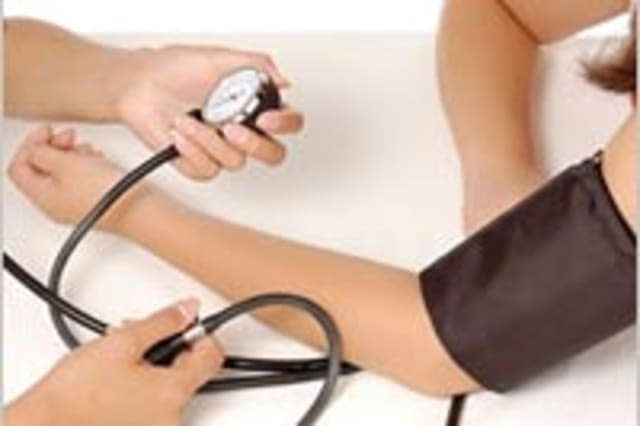Ten surprising things that could be raising your blood pressure
Nearly one-in-four adults in the UK has high blood pressure, which significantly increases the risk of strokes and heart disease. Being overweight and not doing enough exercise can increase your risk of hypertension - and salt, alcohol and stress don't help – but there are other triggers too. Here are 10 surprising things that can raise your blood pressure.

See also: Ten surprising ways to lower your blood pressure
See also: Three things NEVER to do if you think you're having a heart attack

1. Eating too much sugar
You know that salt is bad for your blood pressure – but it turns out that eating too much sugar could be even worse. Researchers from New York and Kansas found that high sugar levels affects the hypothalamus in the brain, which causes the heart rate to quicken and blood pressure to rise. At the same time, it causes the body to produce more insulin, which may cause the heart to beat faster.
Writing in the American Journal of Cardiology, lead researcher Dr James DiNicolantonio said that sugar, and not the salt, may be the actual causative factor for high blood pressure – an idea which has been backed up by large-scale studies.
Current guidelines suggest that we should eat no more than seven teaspoons of sugar a day, as eating too much can cause obesity and type 2 diabetes. While it's a good idea to cut back on sweets and biscuits, it's important to keep an eye on processed foods and breakfast cereals, which can contain high amounts of hidden sugar.
2. Sleep apnoea
Sleep apnoea is a common condition that causes the tissues of the throat to relax and block the airways. The resulting lack of oxygen triggers you to wake up, often with a loud snort or gasp, before falling asleep again. This can happen hundreds of times during a single night without you realising. Not only does it cause excessive tiredness, dry mouth and morning headache, the condition is also known to raise blood pressure.
Overweight men aged between 60 and 65 are most at risk. Because it can be hard to identify, as many as one-in-three sufferers may not be aware that they have a problem. If you often feel tired, it's worth speaking to your doctor and getting your blood pressure checked at the same time.
3. Hot tubs and saunas
The heat may be relaxing, especially if you suffer from aching muscles and joints, but hot tubs and saunas can cause your blood pressure to rise. If you already suffer from hypertension and your doctor has told you to avoid moderate exercise, be careful that you don't overheat when using hot tubs and saunas.
4. Paracetamol & aspirin
Certain common drugs can cause your blood pressure to rise, according to research published in the Archives of Internal Medicine. A study from Harvard Medical School in Boston, Massachusetts, found that people who took paracetamol, aspirin or non-steroidal anti-inflammatory drugs (NSAIDs) such as ibuprofen six or seven days per week over a two-year period were up to a third more likely to be diagnosed with high blood pressure.
Some herbal supplements, such as ginseng, liquorice and ephedra, may have a similar effect and even over-the-counter cold remedies containing decongestant can promote a higher blood pressure. If you're concerned, speak to your doctor or check with your pharmacist before taking medication.
5. Skipping breakfast
Eating at irregular times and skipping meals has been linked to a higher risk of high blood pressure, type 2 diabetes and obesity. One Harvard study found that men who skipped breakfast were 27% more likely to have a heart attack or die from coronary heart disease.
Experts say that fasting is a stressful state for the body, and regularly going without breakfast puts a strain on our bodies that over time can lead to blood pressure problems, as well as insulin resistance and an excess of cholesterol in the bloodstream – all of which can lead to heart trouble.
6. You live somewhere noisy
Noise pollution isn't just a nuisance – prolonged exposure to loud noise can raise your blood pressure. Researchers from Poland found that people who live in a high-noise area (such as under a flight path or next to heavy traffic) for three years were more likely to suffer from high blood pressure. Several other studies have found a link between prolonged noise pollution and reduced life expectancy.
7. You eat too many spuds
You might want to go easy on the spuds. A study from Harvard Medical School found that people who ate potatoes four times a week had higher blood pressure. One theory is that the high starch content triggers a rapid rise in blood sugar levels, which can lead to increased blood pressure over time.
8. You don't eat yoghurt
While you are watching your diet, you may want to consider eating more yoghurt. Researchers from the Boston University School of Medicine found that women who ate five or more servings of yoghurt each week where 20% less likely to have high blood pressure, compared to those who ate only one serving a month.
9. Vitamin D deficiency
Several studies have found a link between low vitamin D and an increased risk of hypertension. According to a study published in the Journal of Investigative Dermatology, sunlight alters skin and blood levels of nitric oxide, which plays a key role in the regulation of blood pressure. If you're unable to get enough sunshine in the winter months, it's worth taking a vitamin D supplement.
10. Napping during the day
You might feel better for an afternoon snooze, but sleeping during the day has been linked to high blood pressure. In fact, taking a nap can raise your blood pressure by up to a fifth, say researchers from the Mayo Clinic.



